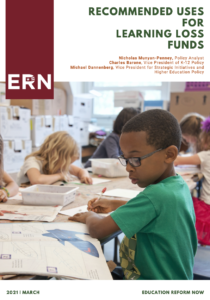The recent passage of the American Rescue Plan Act (ARPA) is infusing America’s K12 public schools with unprecedented, desperately needed relief funds to aid in the academic recovery of students in the wake of the COVID-19 pandemic. The $122 billion allocated to K12 public schools represents over seven times current annual Title I funding. As a part of these relief dollars, Congress has required that states and districts designate 5% and 20%, respectively, to specifically addressing learning loss, totaling $28 billion. This funding gives education leaders across the country the opportunity to make significant investments in evidence-based programs.

We pose four recommendations—that each have a strong evidence base for improving students’ academic, social, and emotional outcomes—for usage of ARPA funds for states to consider.
High-Impact Tutoring
High-impact tutoring programs show clear, positive results, particularly for the lowest-achieving students. Students participating in these programs have gained an additional one to two years of math and an additional year of learning in English language arts—on top of what they learned in the classroom—compared to nonparticipants. In a recent meta-analysis of 14 types of educational interventions, high-impact tutoring was found to be the most effective at improving student achievement.
Summer Enrichment Programs
Extending the length of the school day could be a critical way to increase instructional time for students in an effort to make up for lost instruction as a result of COVID-related school closures. Extending the school day should be paired with a specific academic intervention, such as the additional literacy instruction or high-dosage tutoring.
Extended School Days
After many students have been out of school buildings for over a year, this summer will be crucial to provide an opportunity to allow students. Given that students of color, students from low-income families, student with disabilities, and English learners were disproportionately impacted by the pandemic and school closures, summer programming will also be critical to getting these students prepared to access grade-level content next school year.
Community Based Learning Hubs
Over the course of the pandemic as students and their families were struggling with the realities of remote learning, community- and faith-based organizations around the country stepped up to fill in the gaps. These organizations created learning hubs that provide access to basic needs, academic support, and enrichment activities.
For further information and more in-depth details on our recommendations and implementation, please click here.